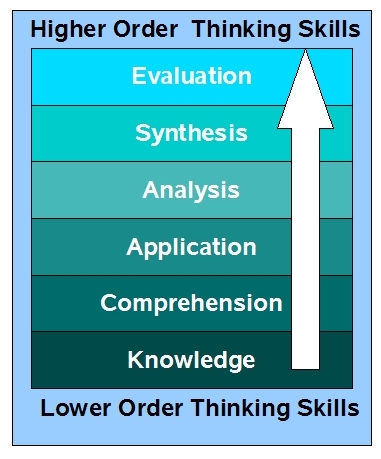 On the weekends, Saturday and Sunday from 9-6, I take a TESL course (Teaching English as a Second Language) in another city. Along with a full-time job it is exhausting but useful and informative.
On the weekends, Saturday and Sunday from 9-6, I take a TESL course (Teaching English as a Second Language) in another city. Along with a full-time job it is exhausting but useful and informative.
This week I learned about something you might already be familiar with: Bloom’s Taxonomy of thinking skills. I find it valuable when I apply to religious knowledge and spiritual wisdom. This is my own idea and only suggest this. I hope you find it helpful.
Knowledge is the lowest form of thinking. This is the accumulation of facts. At this lowest level you can recall data or information. For instance, you might know your scripture verses and be able to recite a creed or know the facts about doctrinal theology.
Comprehension is the next level. Here you begin to understand the meaning of verses and creeds and doctrines. You understand it at a level where you can actually state them in your own words and discuss them. This shows you have a deeper understanding of them than the simple rote knowledge of the first level.
Application is the third level. At this level you not only know your scriptures and some doctrinal theology, but you begin to understand how to apply it to your personal life and real life situations. In other words, scripture and theology is a kind of second nature to you because you apply what you know to novel situations in your life.
Analysis is the next highest level. The first 3 levels (knowledge, comprehension, application) are the most common levels achieved. Analysis is a more advanced kind of thinking because you can separate the concepts into parts. You begin to see the framework, the under-girding, the skeleton, and the connections in the texts and doctrines. You are beginning to be able to critique the texts and doctrines and their relationship to one another.
Synthesis is the fifth level where you begin to build your own structure and pattern of thinking out of the diverse elements from the texts and doctrines. You unite different parts together to form a new kind of whole. You create a new meaning or structure of thought that is uniquely your own. You find a way to assimilate and integrate various elements of thought, even from outside your own tradition or system, into your own way of thinking (or some might say “believing”).
Evaluation is the final level. At this level you not only are able to critique the texts and doctrines and their relationship to one another, but you are able to make judgments about the whole thought system and belief system altogether. You can even make judgments about the value of the religious ideas you were taught or that you possess. At this level you evaluate not only the entire system, but its value and relation to other systems. This is the most mature level.
I find it interesting that the highest level is evaluation. One might assume that synthesis should be because that would be our goal. Would it not? Like Jung taught, synthesis would resemble integration, which is the highest level of psychological development. But evaluation as the highest level implies that we never truly arrive. Whenever we think we’ve arrived and no longer need to change, then evaluation, not only of our system of thought but of our selves, is needed to break down our intellectual, religious and spiritual strongholds, challenge our resistance to change, and inspire us to be transformed. Continually.
Nothing is permanent. We must be changed!











